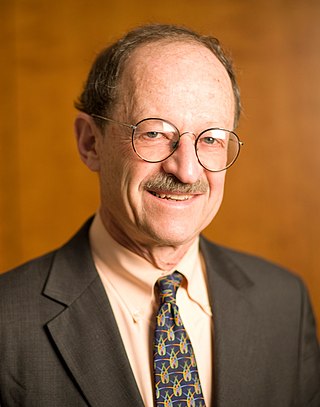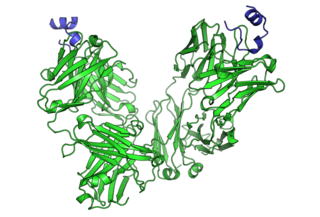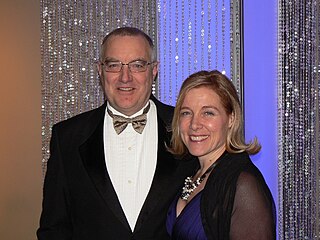Related Research Articles

Harold Eliot Varmus is an American Nobel Prize-winning scientist. He is currently the Lewis Thomas University Professor of Medicine at Weill Cornell Medicine and a senior associate at the New York Genome Center.

Cancer immunotherapy is the stimulation of the immune system to treat cancer, improving on the immune system's natural ability to fight the disease. It is an application of the fundamental research of cancer immunology and a growing subspecialty of oncology.
An oncolytic virus is a virus that preferentially infects and kills cancer cells. As the infected cancer cells are destroyed by oncolysis, they release new infectious virus particles or virions to help destroy the remaining tumour. Oncolytic viruses are thought not only to cause direct destruction of the tumour cells, but also to stimulate host anti-tumour immune system responses. Oncolytic viruses also have the ability to affect the tumor micro-environment in multiple ways.
Virotherapy is a treatment using biotechnology to convert viruses into therapeutic agents by reprogramming viruses to treat diseases. There are three main branches of virotherapy: anti-cancer oncolytic viruses, viral vectors for gene therapy and viral immunotherapy. These branches use three different types of treatment methods: gene overexpression, gene knockout, and suicide gene delivery. Gene overexpression adds genetic sequences that compensate for low to zero levels of needed gene expression. Gene knockout uses RNA methods to silence or reduce expression of disease-causing genes. Suicide gene delivery introduces genetic sequences that induce an apoptotic response in cells, usually to kill cancerous growths. In a slightly different context, virotherapy can also refer more broadly to the use of viruses to treat certain medical conditions by killing pathogens.

John Cameron Bell is a senior cancer researcher at the OHRI. He currently resides in Ottawa, Ontario with his wife Sheila.

Sue Desmond-Hellmann is an American oncologist and biotechnology leader who served as the Chief Executive Officer of the Bill & Melinda Gates Foundation from 2014–2020. She was previously Chancellor of the University of California, San Francisco (UCSF), the first woman to hold the position, and Arthur and Toni Rembe Rock Distinguished Professor, and before that president of product development at Genentech, where she played a role in the development of the first gene-targeted cancer drugs, Avastin and Herceptin.

A genetically modified virus is a virus that has been altered or generated using biotechnology methods, and remains capable of infection. Genetic modification involves the directed insertion, deletion, artificial synthesis or change of nucleotide bases in viral genomes. Genetically modified viruses are mostly generated by the insertion of foreign genes intro viral genomes for the purposes of biomedical, agricultural, bio-control, or technological objectives. The terms genetically modified virus and genetically engineered virus are used synonymously.
JX-594 is an oncolytic virus is designed to target and destroy cancer cells. It is also known as Pexa-Vec, INN pexastimogene devacirepvec) and was constructed in Dr. Edmund Lattime's lab at Thomas Jefferson University, tested in clinical trials on melanoma patients, and licensed and further developed by SillaJen.

James Patrick Allison is an American immunologist and Nobel laureate who holds the position of professor and chair of immunology and executive director of immunotherapy platform at the MD Anderson Cancer Center at the University of Texas.

Jennerex Biotherapeutics, Inc. was an American private biopharmaceutical company that developed the oncolytic viruses JX-594 and JX-929 among others. By creating oncolytic viruses that can (1) kill tumor cells directly through lysis, (2) activate the immune system by delivering genes that encode immunostimulants and by overcoming tumor cell-induced immunological tolerance, and (3) reduce tumor nutrient supply through the destruction of blood vessels, Jennerex aimed to create a novel approach to treating and possibly curing cancer.

Talimogene laherparepvec, sold under the brand name Imlygic, is a biopharmaceutical medication used to treat melanoma that cannot be operated on; it is injected directly into a subset of lesions which generates a systemic immune response against the recipient's cancer. The final four year analysis from the pivotal phase 3 study upon which TVEC was approved by the FDA showed a 31.5% response rate with a 16.9% complete response (CR) rate. There was also a substantial and statistically significant survival benefit in patients with earlier metastatic disease and in patients who hadn't received prior systemic treatment for melanoma. The earlier stage group had a reduction in the risk of death of approximately 50% with one in four patients appearing to have met, or be close to be reaching, the medical definition of cure. Real world use of talimogene laherparepvec have shown response rates of up to 88.5% with CR rates of up to 61.5%.

Many variants of herpes simplex virus have been considered for viral therapy of cancer; the early development of these was thoroughly reviewed in the journal Cancer Gene Therapy in 2002. This page describes the most notable variants—those tested in clinical trials: G207, HSV1716, NV1020 and Talimogene laherparepvec. These attenuated versions are constructed by deleting viral genes required for infecting or replicating inside normal cells but not cancer cells, such as ICP34.5, ICP6/UL39, and ICP47.
Adenovirus varieties have been explored extensively as a viral vector for gene therapy and also as an oncolytic virus.
The Center for Cell and Gene Therapy is a translational research institute within Baylor College of Medicine, Texas Children's Hospital and Houston Methodist Hospital, all of which are located in the Texas Medical Center in Houston, Texas. The center's mission is to develop novel therapies for a range of diseases through collaboration between basic research laboratories and clinical departments. The center was founded by Dr. Malcolm K. Brenner in 1998 and includes six major parts. The current director is Dr. Helen E. Heslop, physician-scientist who specializes in translational research.
Imugene Ltd is a clinical stage immuno-oncology company developing a range of new and novel immunotherapies that seek to activate the immune system of cancer patients to treat and eradicate tumours. Imugene's unique platform technologies seeks to harness the body's immune system against tumours, potentially achieving a similar or greater effect than synthetically manufactured monoclonal antibody and other immunotherapies.
Andrew Louis Pecora is an American hematologist and oncologist involved in research on the use of stem cells and oncolytic viruses to treat diseases, including cancer. He is the CEO of Outcomes Matter Innovations. As of 2020, he is on the Board of Directors Celularity, Inc. (since 2017) and founder and Executive Chairman, COTA, Inc.. Previously, he was chief innovations officer, professor and vice president of cancer services at the John Theurer Cancer Center, part of the Hackensack University Medical Center. He is a professor of medicine and oncology at Georgetown University.

Duane A. Mitchell is an American physician-scientist and university professor. He is currently employed at the University of Florida College of Medicine, in Gainesville, Florida as the Assistant Vice President for Research, Associate Dean for Translational Science and Clinical Research, and Director of the University of Florida (UF) Clinical and Translational Science Institute. He is the Phyllis Kottler Friedman Professor in the Lillian S. Wells Department of Neurosurgery. and co-director of the Preston A. Wells Jr. Center for Brain Tumor Therapy. Mitchell is also the founder, President, and Chairman of iOncologi, Inc., a biotechnology company in Gainesville, FL specializing in immuno-oncology.

Uğur Şahin is a German oncologist and immunologist. He is the founder and CEO of BioNTech, which developed one of the major vaccines against COVID-19. His main fields of research are cancer research and immunology.

Nirmatrelvir is an antiviral medication developed by Pfizer which acts as an orally active 3C-like protease inhibitor. It is part of a nirmatrelvir/ritonavir combination used to treat COVID-19 and sold under the brand name Paxlovid.
Transgene S.A. is a French biotechnology company founded in 1979. It is based in Illkirch-Graffenstaden, near Strasbourg, and develops and manufactures immunotherapies for the treatment of cancer.
References
- ↑ Yan, Wudan (2015-09-01). "Starting up and spinning out: The changing nature of partnerships between pharma and academia". Nature Medicine. 21 (9): 968–971. doi:10.1038/nm0915-968. ISSN 1078-8956. PMID 26340114. S2CID 43236613.
- ↑ Mai, Don. "About the Schaffer Lab". Schaffer Research Group. University of California Berkeley. Retrieved 27 July 2015.
- ↑ "UC Berkeley Life Sciences Entrepreneurship Center". UC Berkeley. Retrieved 16 February 2023.
- ↑ "Pfizer backs and nabs an option to buy newly launched Bay Area startup Ignite Immunotherapy". Biospace.
- ↑ "David H. Kirn M.D.: Executive Profile & Biography". Bloomberg. Retrieved 27 July 2015.
- ↑ "David Kirn, MD". CALBIO 2015.
- ↑ Holtz, Andrew (1 May 2007). "To Build a Killing Machine". The Scientist. LabX Media Group.
- ↑ Kirn, David; Martuza, Robert L.; Zwiebel, James (2001). "Replication-selective virotherapy for cancer: Biological principles, risk management and future directions". Nature Medicine. 7 (7): 781–787. doi: 10.1038/89901 . PMID 11433341. S2CID 197041.